 The category of Supporting Actress often provides a really "supportive" platform upon which performers can receive acknowledgment for branching out, for spreading their wings, for proving their versatility, for demonstrating that they really do have the chops. It's part of what I love about the category -- the opportunity to see performers at what are occasionally watershed moments in their careers. However, time is not always kind to these "breakthrough" moments. Sometimes when the contemporary shock wears off, the seams really show, as this week's actress at the edges...
The category of Supporting Actress often provides a really "supportive" platform upon which performers can receive acknowledgment for branching out, for spreading their wings, for proving their versatility, for demonstrating that they really do have the chops. It's part of what I love about the category -- the opportunity to see performers at what are occasionally watershed moments in their careers. However, time is not always kind to these "breakthrough" moments. Sometimes when the contemporary shock wears off, the seams really show, as this week's actress at the edges...approximately 21 minutes and 32 seconds
11 scenes
roughly 22% of film's total running time
11 scenes
roughly 22% of film's total running time
Ann-Margret plays Bobbie, a groovy goodtime gal with crazy curves who happens to be pushing thirty as she hooks up with Jonathan Fuerst (Jack Nicholson, in an implausibly sexy, incredibly loathsome turn as a ladykiller who seems entirely capable of one day living up to the title, literally).
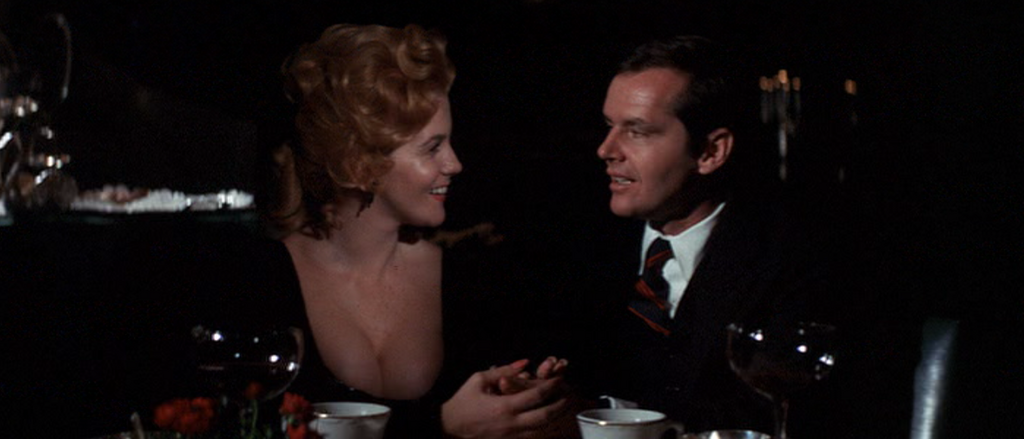 Ann-Margret's Bobbie is (the script tells us) loads of fun...a perfect Playmate, if you will. An actress/model, Bobbie's neither too smart nor too dumb, she's not the marrying kind, and she's stacked with enough junk in the trunk to balance the funbags up top. (Forgive the crass parlance, but the previous statement is merely a contemporization of a speech Nicholson's Jonathan gives in the scene immediately prior to Bobbie's introduction.) Plus, she knows how to have a real good time.
Ann-Margret's Bobbie is (the script tells us) loads of fun...a perfect Playmate, if you will. An actress/model, Bobbie's neither too smart nor too dumb, she's not the marrying kind, and she's stacked with enough junk in the trunk to balance the funbags up top. (Forgive the crass parlance, but the previous statement is merely a contemporization of a speech Nicholson's Jonathan gives in the scene immediately prior to Bobbie's introduction.) Plus, she knows how to have a real good time.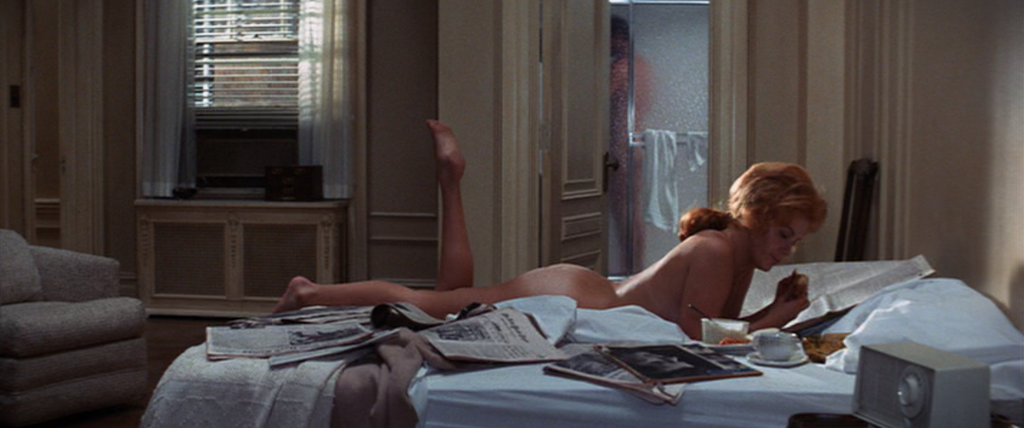 Bobbie's babeness is just the beginning for, soon, Bobbie and Jonathan are enmeshed in a giddy erotic companionship that shifts from a one night stand to one of the one-year variety. And, of course, Bobbie's the one to start bringing up things like "shacking up" and the compromises of commitment (which Nicholson's Jonathan greets with surly, possessive resentment) begin to corrupt the freewheeling fun of their bond. Quickly, Jonathan's fantasy Playmate transforms -- at least in his eyes -- into a dumpy shrew, with Bobbie quickly drowning in the despair of a pathetic domesticity.
Bobbie's babeness is just the beginning for, soon, Bobbie and Jonathan are enmeshed in a giddy erotic companionship that shifts from a one night stand to one of the one-year variety. And, of course, Bobbie's the one to start bringing up things like "shacking up" and the compromises of commitment (which Nicholson's Jonathan greets with surly, possessive resentment) begin to corrupt the freewheeling fun of their bond. Quickly, Jonathan's fantasy Playmate transforms -- at least in his eyes -- into a dumpy shrew, with Bobbie quickly drowning in the despair of a pathetic domesticity.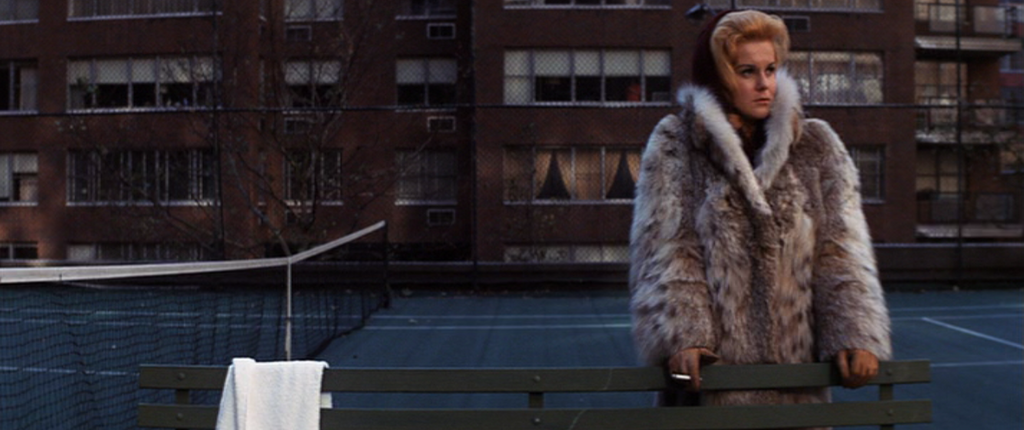 On some levels, the pairing (Bobbie and Jonathan; Ann-Margret and Nicholson) is formidable and fascinating. The characters are as equals -- sexual players who discover a kind of impossible compatibility -- and the performers are too -- intensely charismatic personas capable of indelible screen work. And to an extent, the pairing works. Ann-Margret is the ideal kind of actress to play opposite Nicholson (an actor known for playing "against" his co-stars), her tropical storm a formidable front against Hurricane Jack.
On some levels, the pairing (Bobbie and Jonathan; Ann-Margret and Nicholson) is formidable and fascinating. The characters are as equals -- sexual players who discover a kind of impossible compatibility -- and the performers are too -- intensely charismatic personas capable of indelible screen work. And to an extent, the pairing works. Ann-Margret is the ideal kind of actress to play opposite Nicholson (an actor known for playing "against" his co-stars), her tropical storm a formidable front against Hurricane Jack.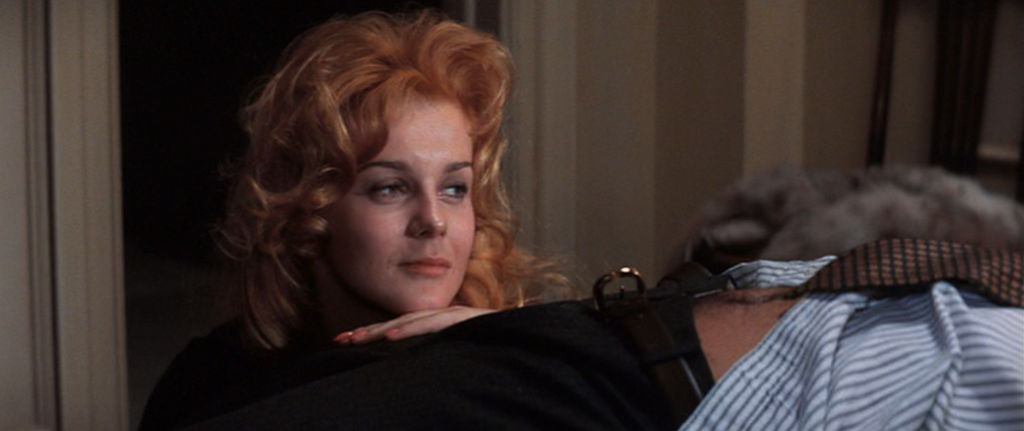 And on a couple scores, Ann-Margret nails it. The intensity of her Bobbie's vulnerability is palpable. Her sex appeal is inhabited not adorned. Her charisma is organic, inevitable, unstoppable.
And on a couple scores, Ann-Margret nails it. The intensity of her Bobbie's vulnerability is palpable. Her sex appeal is inhabited not adorned. Her charisma is organic, inevitable, unstoppable.But (and here I've finally figured out why Ann-Margret isn't more of a camp icon) Ann-Margret is no fun. Her Bobbie is utterly humorless, despite the fact that she's supposed to be all kinds of laughs (and despite the fast that she is mildy amusing in the one jokey scene the script gives her - a doctor/nurse shower sketch that plays like a Playboy cartoon come to life). Her Bobbie doesn't enjoy being Bobbie but, from the first scene, wants to be someone else. In a fundamental misunderstanding of the character, Ann-Margret's Bobbie emerges as a vixen of physical circumstance rather than personal choice. In and of itself, this would not be a problem, except that the script keeps talking about how much fun Bobbie is and, if we can't appreciate the fact that Bobbie wants to change while Jonathan does not, the story arc becomes an exhausting dead-end.
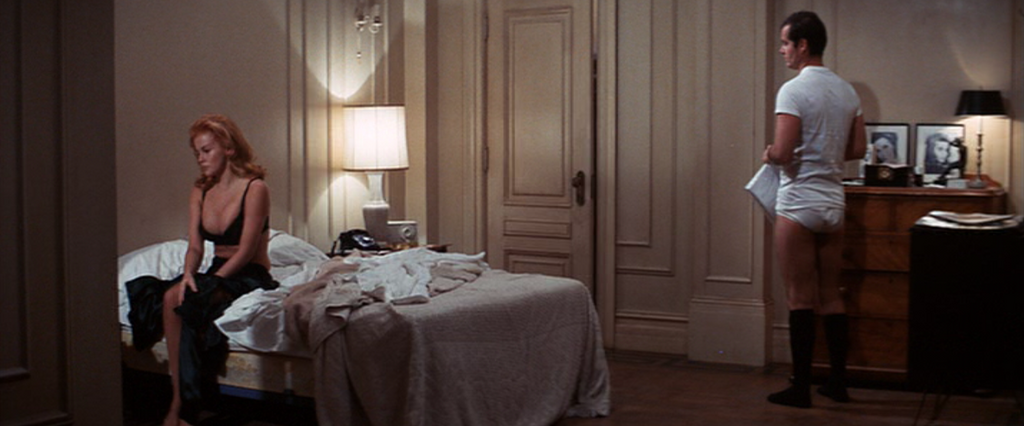 Without, then, even a whit of wit, Ann-Margret's performance is further hobbled by her inability to handle the language of Jules Feiffer's patter-dense script. Vocally, Ann-Margret seems incapable of nuance unless speaking in a whisper, and her diction devolves as volume and emotion rise. Yes, Ann-Margret can work a pause like a pro but, once she speaks, any mystery and intensity is garbled along with her consonants.
Without, then, even a whit of wit, Ann-Margret's performance is further hobbled by her inability to handle the language of Jules Feiffer's patter-dense script. Vocally, Ann-Margret seems incapable of nuance unless speaking in a whisper, and her diction devolves as volume and emotion rise. Yes, Ann-Margret can work a pause like a pro but, once she speaks, any mystery and intensity is garbled along with her consonants.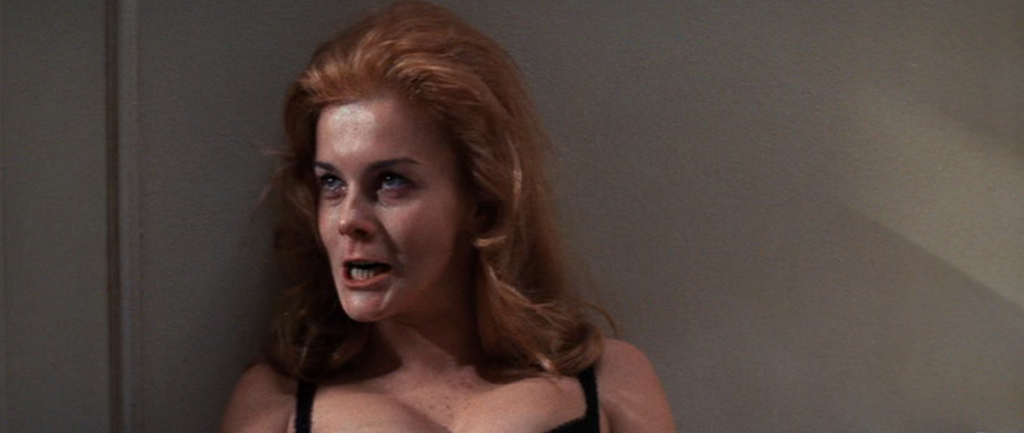 Sadly, Ann-Margret's goopy humorlessness makes no sense of Bobbie, and all that Ann-Margret can do is lapse to what has become her dramatic default -- feral despair -- thus missing Bobbie's character arc entirely. Nichols makes hay from Ann-Margret's intensity, but it doesn't serve either the character or the film.
Sadly, Ann-Margret's goopy humorlessness makes no sense of Bobbie, and all that Ann-Margret can do is lapse to what has become her dramatic default -- feral despair -- thus missing Bobbie's character arc entirely. Nichols makes hay from Ann-Margret's intensity, but it doesn't serve either the character or the film.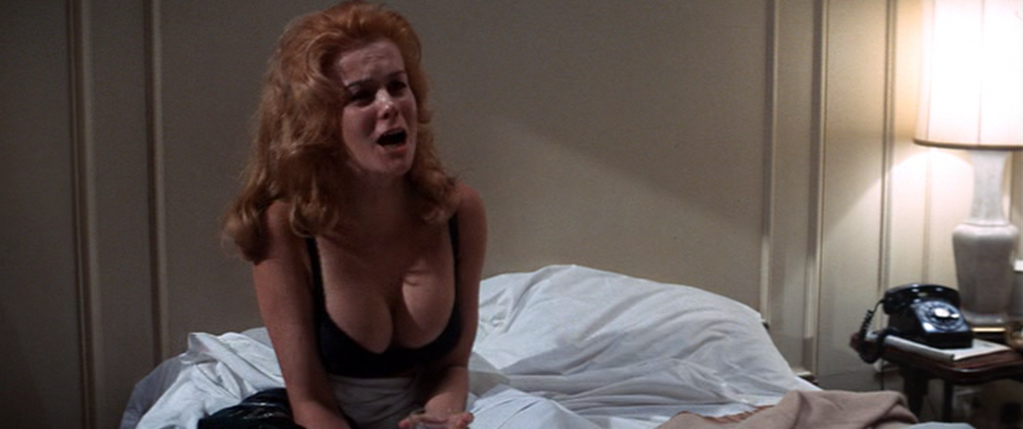 Ann-Margret's Bobbie is stunt-casting at its most adept. The shock of Bobbie's curves are equal to the frankness of her despair. But in a film loaded with more skilled performances by actresses who can maneuver the dialog to reveal the nominal depths of Feiffer's shallowly misogynist archetypes (Rita Moreno just "blows" the roof off in an incredible, scary cameo), Ann-Margret's way out of her depth, adding another bold misfire to a career full of same.
Ann-Margret's Bobbie is stunt-casting at its most adept. The shock of Bobbie's curves are equal to the frankness of her despair. But in a film loaded with more skilled performances by actresses who can maneuver the dialog to reveal the nominal depths of Feiffer's shallowly misogynist archetypes (Rita Moreno just "blows" the roof off in an incredible, scary cameo), Ann-Margret's way out of her depth, adding another bold misfire to a career full of same.

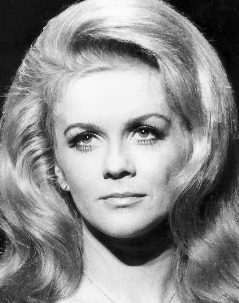

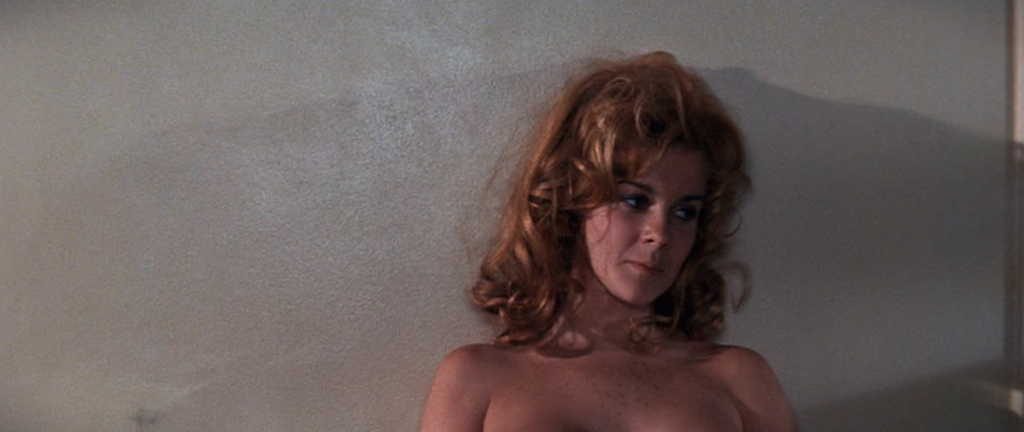
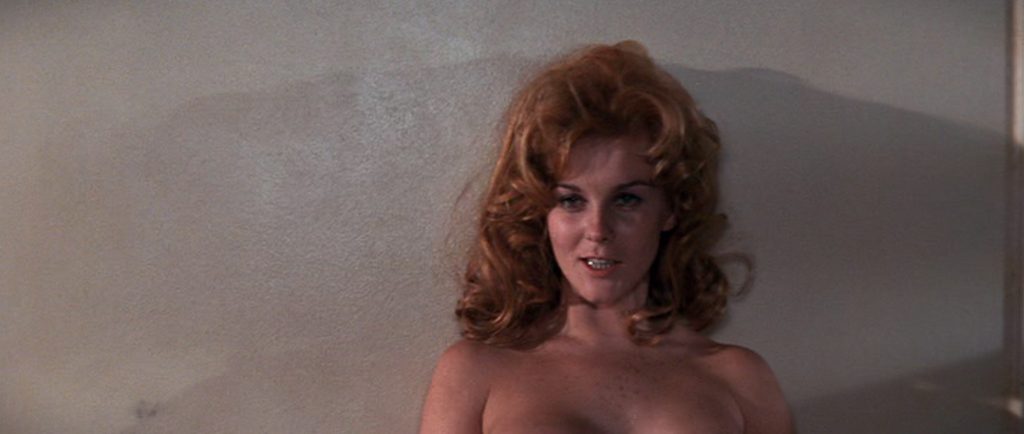
3 comments:
I'm not sure we can blame Mrs. Smith for the character's surfacy attributes when the going gets tough. If Mike Nichols had wanted Bobbie to get metaphysical or temperamentally rich, I don't think he would have let this 'slip by.'
In the scenes standing around the car park and schoolyard Bobbie is filled with complex emotion. That she cannot give voice to it has always seemed to me an important part of the character - a recognizable one during those decades.
Less recognizable today, when celebrity is often without achievement or talent at all. And when women-with-sexiness characters are still bucking stereotypes in their best moments - like Erin Brockovich.
No, I believe the Bobbie character is supposed to be as commonplace as the film succeeds in making her. Our trouble is we don't like that lack of verve - the reality of millions of lives.
The only one who calls Bobbie fun is Jonathan. Is Jonathan's conception of "fun" something the audience shares? Rather than take Jonathan at his word, maybe the tension is in the difference between what Jonathan wants and what the audience observes. Certainly there's nothing less erotic than the last scene featuring Moreno, despite Jonthan's reaction. Moreno tries to have fun with new dialogue but he's got no sense of humor in the bedroom. In the same way, there's no fun in his patter as he guesses Bobbie's age - it's him telling her that her diminishing leverage is his increasing power. That leaves me thinking that Bobbie's funlessness is more intentional than a reflection of Ann-Margret's lack of charisma.
Post a Comment